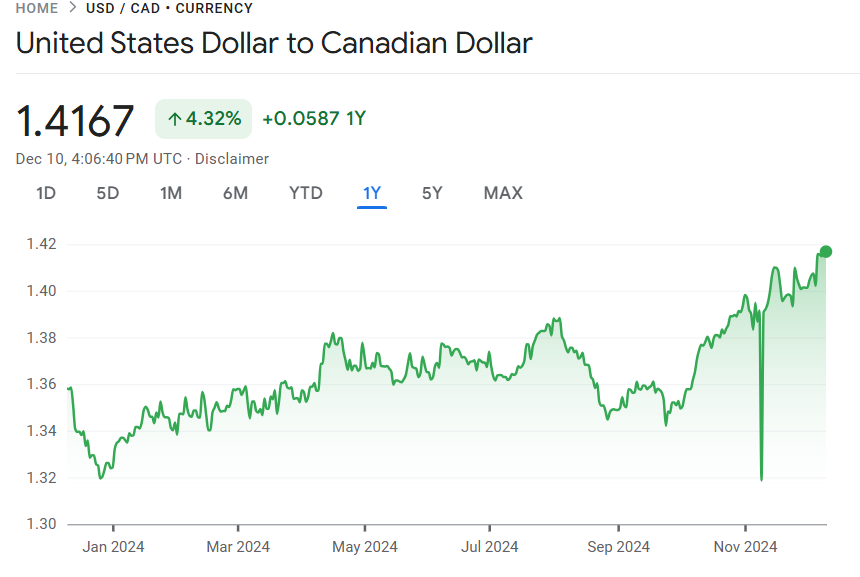Recently, the weakening Canadian dollar (CAD) against the US dollar (USD) has raised concerns for many investors. As of December 10, 2024, the USD/CAD exchange rate is 1.4167, marking a 4.32% increase over the past year. This article explores how one might consider diversifying investments to combat inflation and currency depreciation.
Note: This is not financial advice—just personal curiosity and exploration.

Understanding the Current Economic Context
Currency fluctuations can erode the purchasing power of savings and investments. When a currency weakens, imported goods and services become more expensive, contributing to inflation. For Canadians, strengthening the USD means that assets denominated in USD or tied to global markets could potentially serve as a hedge against local currency depreciation.
Strategies to Consider for Investments
1. Investing in US-Dollar-Denominated Assets
Investors looking to hedge against a weakening CAD might consider assets denominated in USD. Examples include:
- US Stocks: Investing in high-performing US companies, particularly in sectors like technology, healthcare, and finance, can provide growth potential. Notable examples include:
- NVIDIA Corporation (NVDA): A leader in AI hardware and GPUs.
- Amazon.com Inc. (AMZN): A pioneer in AI integration through AWS and e-commerce
- Tesla Inc. (TSLA): Innovating in EVs and autonomous driving.
- Alphabet Inc. (GOOGL): Leading in AI and digital advertising.
- ETFs (Exchange-Traded Funds): Popular ETFs like SPY (S&P 500) or QQQ (NASDAQ-100) provide diversified exposure to the US stock market.
2. Investing in Technology and Innovation
Technology and AI sectors have been significant drivers of market growth:
- Technology Funds: Funds like the RBC Global Technology Fund focus on companies that are leading in AI, semiconductors, and cloud computing. Its portfolio includes top players such as NVIDIA, Microsoft, and Meta Platforms.
- AI-Centric Companies: Businesses like
Palantir Technologies (PLTR),
Snowflake Inc. (SNOW),
C3.ai Inc. (AI),
Block Inc. (SQ),
and Advanced Micro Devices (AMD),
are paving the way in data analytics, enterprise AI solutions, decentralized finance, and AI-driven cloud computing.
3. Investing in Real Estate
Real estate investments in the US can provide another way to hedge against currency depreciation:
- Direct Real Estate Investments: Purchasing properties in USD could safeguard capital if the CAD continues to weaken.
- Real Estate Investment Trusts (REITs): Investing in US REITs offers exposure to the real estate market without requiring direct property ownership.
4. Investing in Cryptocurrencies
Cryptocurrencies, although volatile, have gained attention as an alternative investment:
- Bitcoin (BTC): The leading cryptocurrency, often seen as digital gold.
- Ethereum (ETH): Known for its smart contract capabilities.
- Alt-coins
- Crypto Companies: Stocks like Coinbase Global Inc. (COIN) and Riot Platforms Inc. (RIOT) provide exposure to the crypto market.
5. Utilizing ETFs Available in Canada
For those hesitant to invest directly in US markets, Canadian ETFs that track US indices or sectors can be a viable option:
- S&P 500 ETFs: These ETFs provide exposure to the top 500 companies in the US.
- NASDAQ-100 ETFs: Focused on technology-heavy companies.
The Case of RBC Global Technology Fund
For technology enthusiasts, the RBC Global Technology Fund serves as an interesting case study. Here’s a snapshot:
- Portfolio Highlights:
- Top holdings: NVIDIA, Microsoft, Alphabet, and Meta Platforms.
- Sector allocation: 73.9% in information technology.
- Geographic allocation: 91.6% in the US.
- Performance:
- 2021: +38.1%
- 2022: -31.8% (reflecting market downturns)
- 2023: +51.6% (rebounding strongly)
- 2024 YTD: +29.8%
- Conclusion: This fund demonstrates the growth potential of tech-focused investments.
Key Considerations and Risks
While investing in foreign assets or innovative sectors can be rewarding, it’s essential to recognize the associated risks:
- Currency Risk: Fluctuations in exchange rates can impact returns.
- Market Volatility: Technology and cryptocurrencies are particularly susceptible to rapid changes.
- Regulatory Challenges: Investments in cryptocurrencies and cross-border assets can face regulatory hurdles.
Final Thoughts
Investing in assets that are less tied to the local economy, such as US stocks, technology funds, or real estate, can help mitigate the effects of inflation and currency depreciation. However, every investment comes with risks, and strategies should align with individual financial goals and risk tolerance.
Disclaimer: This article is based on personal curiosity and does not constitute financial advice. Always consult with a financial advisor before making investment decisions.

